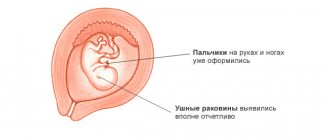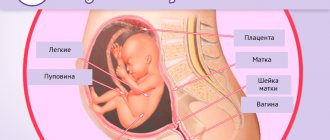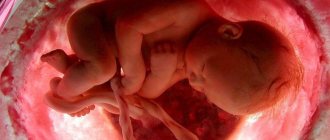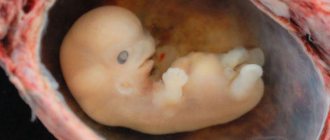Gender of the baby at 18 weeks
Most women don't know what gender the baby is in her belly. Exceptions are made when artificial insemination methods are used. What about those whose pregnancy was the result of a natural process? There are several options:
- Leave the question of determining gender unanswered until the moment of birth. The huge temptation to start buying things in the right color is understandable. However, a surprise after childbirth can be a pleasant and memorable highlight.
- There are modern laboratory methods. Based on the polymerase chain reaction, the Y chromosome of the fetus is determined in the venous blood of the expectant mother. The female chromosome set consists of only X components. Therefore, the detection of the Y fragment indicates the presence of a male fetus in the uterus. This laboratory diagnostic method can be applied at any stage of pregnancy and is quite accurate.
- Determine the sex of the unborn child using ultrasound diagnostics (ultrasound). Modern capabilities of diagnostic equipment and highly qualified doctors allow us to examine the fetal genitalia in detail. However, determining gender can be difficult. This occurs due to the baby's insufficiently open posture or swelling of the genitals. In these cases, the clitoris can be mistaken for the penis, and the labia can be confused with the scrotum. Determining the sex of a child using ultrasound is most effective from 23 weeks of pregnancy.
- Sex determination using chorionic villus sampling. Despite the moderate traumatic nature (the material for research is removed with a needle), the method is not used based on wishes. It can only be prescribed by a doctor, and only for medical reasons.
Ultrasound indications
An ultrasound at 18 weeks is prescribed if there is a risk of developmental anomalies. Suspicions that doctors have after the first study can already be confirmed or refuted. The fruit is 12-15 cm in size, with formed jaws and palate. Often, at 18 weeks, an ultrasound is prescribed if a child is suspected of having a cleft palate. This is the last date at which you can have an abortion for medical reasons.
More often, doctors have the opportunity to carry out the necessary therapy before birth and avoid unpleasant consequences. And at 18 weeks, the mother has the opportunity to find out that everything is fine with the baby.
If, according to the results of the first ultrasound, everything is fine with the embryo and there is no danger of developing pathologies, it is better to postpone the ultrasound until the planned 20-24 weeks.
Is it possible to feel movements at 18 weeks and what are they?

Often women imagine the first meeting with a baby as something unusual. The first movement is often described as the splash of a fish, the flutter of a butterfly, or the flutter of a bird. The sensations depend only on the perception of the woman herself. The first movement can be perceived as a push, movement of gases, a slight, short-term painless compression in the abdomen.
Being at rest (sitting or lying down) makes it easier to feel the baby's movement. This can happen at work, at home, while driving a car.
At 18 weeks, women who have already carried a child before feel movement. Also, fragile, sensitive women feel the first movement early.
The date of the first movement must be remembered or written down and reported to your doctor. This day is recorded in medical documentation and has diagnostic significance.
What to do if there is no movement at 18 weeks?
It must be remembered that sensations are subjective. With active movements of the fetus, one woman feels them, while the other does not feel anything. This is especially true if you are overweight, as well as in the presence of previous surgical interventions. This clarifies the question of why during the second pregnancy you may not feel any movements at 18 weeks.
It must be remembered that increased fetal activity, perceived by a woman as frequent movements, may be a sign of insufficient oxygen supply. To increase blood supply, the baby intensively flexes and straightens his limbs.
Due to the fact that it is not possible to independently determine the successful development of the fetus, in the absence of movements in the event of a second pregnancy or increased activity of the baby, it is necessary to discuss your doubts with your doctor.
What cannot be used to treat ARVI?
First of all, you need to talk about what is contraindicated during pregnancy:
- Antibiotics are prohibited.
- You should not take hot baths to reduce your temperature, and you should not steam your feet or go to the sauna.
- It is strictly contraindicated to take many medications, including Coldrex, Aspirin, etc.
- It is not allowed to use standard nasal drops - Naphthyzin, Sanorin, etc.
All this must be remembered in order to avoid side effects and undesirable consequences; in addition, it is worth considering the question of what can and should be used to treat colds.
What happens to the baby at 18 weeks of pregnancy (fetal size, fetal weight, baby development)
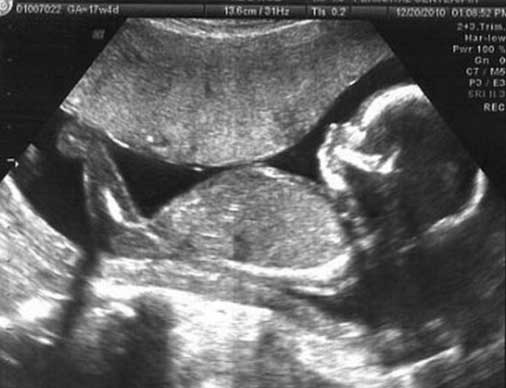
The baby is growing rapidly. Its size reaches 14-15 cm. It can be compared to a mango fruit. Its weight is about 150 grams.
Despite the increase in height and weight, significant transformations do not occur in the baby. It does not so much change as it strengthens the structures of the body. The ratio of body parts becomes more similar to newborns. Other changes in organs and systems occur as follows:
- By week 18, the heart has a four-chamber structure. Features of its functioning can be identified using additional research methods (ultrasound). This may be important for early diagnosis of health in the presence of a predisposition to congenital diseases.
- The baby's hearing is so developed that he hears the noises that arise during the movement of blood, the work of the woman's internal organs, the mother's voice and external noises. Features of the hearing aid allow you to better hear sounds of low tones. This allows you to better hear a man's voice. Therefore, the future dad will be pleased to know that you can talk to your baby.
- The baby's vision allows him to see the surroundings in the form of changing shades and light spots. Its background appears as pinkish and light purple strokes. The baby's eyes are closed, but the reaction to light is clear.
- Bones become stronger. The formation of the finger phalanges is completed. They increase in size.
- Immunity is strengthened. By this time, the baby’s body produces its own interferons and immunoglobulins. This occurs in response to the introduction of an infectious pathogen. This is in stark contrast to the situation in the first trimester, when it could lead to fetal death.
- facial expressions are varied. He makes faces and frowns.
- nervous system allows him to perceive the feelings of the expectant mother. It captures anxiety, sadness, sadness, joy, anger and calm. Therefore, the happiness of the mother is of particular importance for the baby.
What happens to the mother at 18 weeks of pregnancy
The expectant mother feels an increase in the load on the body. At the same time, the woman continues to move actively. Every day the awareness of the approaching birth grows stronger. This will happen in just 4.5 months.
Uterus size
The uterus has a round shape during the 2nd trimester. As the size of the fetus increases, its capacity also increases. The vascular network becomes more branched. The uterus has long left the pelvic cavity. Its size can be determined by external obstetric examination. The uterine fundus height indicator shows the distance from the pubic joint to the uterine fundus. The uterus at the 18th week of pregnancy reaches 17-20 cm above the pubis.
What can be done to treat it?
Treatment should be carried out using folk remedies, but only after consultation with a specialist, because not all methods are safe and effective. Doctors warn that it is better not to lower the temperature to 38 degrees at all, because the body continues to fight the infection on its own. He needs help with this only if the temperature is too high; he is allowed to take a couple of paracetamol tablets. Also, at a temperature, wiping the body with a vinegar solution helps a lot; it is forbidden to take hot baths.
We also recommend: Flu at 4 weeks of pregnancy
Here are some more useful tips on how to cope with ARVI at 18 weeks of pregnancy:
- Carrying out the inhalation procedure with mint oil or boiled potatoes.
- Prepare a compress with alcohol (3 parts water and 1 part alcohol) to relieve a sore throat.
- Lubricating the tonsils with propolis tincture.
- Treatment of a runny nose with Aqua Maris drops. These are absolutely safe drops, as the manufacturers of the product claim and many of its consumers confirm, although in this case you should first consult with your doctor.
- Eating enough vitamins allows you to strengthen your immune system and fight off infections on your own.
- Gargling with sea salt solution.

It is important to eat foods rich in vitamins
All these methods are effective in complex treatment, which will be approved by a specialist. You should not experiment with self-medication, because each of these remedies may have its own contraindications and side effects, and during pregnancy it is too risky to try something new and untested on yourself.
ARVI at 18 weeks of pregnancy is an unpleasant disease that requires immediate treatment. Complications must not be allowed to arise, as this will negatively affect the child’s health. May you never have such problems, and if you do get a cold, then the above recommendations will help you quickly get rid of it without any consequences.
Feelings at 18 weeks
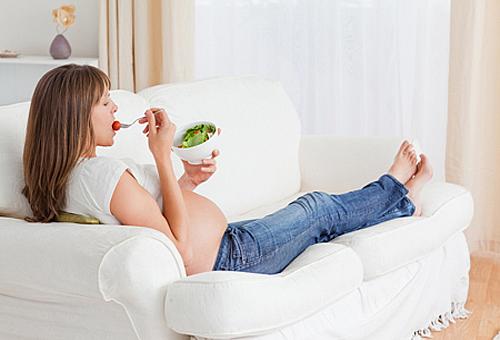
During the normal course of pregnancy, there are no special complaints at week 18. We can highlight the most common individual characteristics that women cope with on their own:
- Sensitivity of the mammary glands. Properly selected underwear made from natural fabrics helps to avoid discomfort. You should consult a specialist if you experience pain, redness of the breast, or an asymmetrical change in the shape of the nipple.
- Bad dream. The most common concern is not the lack of desire to sleep, but the difficulty in choosing the optimal position in which both the woman and the fetus feel good and do not experience oxygen starvation. Poses on the back and on the stomach are not recommended for a period of 18 weeks. The optimal sleeping position is on your side. It is necessary to have enough space for placing pillows under the lower back and collar area. If you learn how to choose a sleeping position now, in later stages it will help you relax while carrying much more weight.
- Tired legs. The uterus increases in size. An increase in fetal weight significantly impairs the functioning of the veins. The lower extremities suffer most from venous insufficiency also because the pregnant uterus compresses the return of blood from the legs. Simple recommendations can significantly improve your well-being. These include: getting rid of high-heeled shoes, raising the lower extremities on a footrest while sitting, and regularly raising the legs with support while lying down.
- Depressed mood. By the 18th week, normalization of the emotional background is observed. A woman has the opportunity to lead an active lifestyle and go for walks. The danger of developing an ectopic pregnancy and many other complications of the first trimester are behind us. Therefore, if anxiety appears that significantly complicates life, does not go away for a long period, and does not disappear after taking valerian, you should consult your doctor about this.
Why do you feel sick at 18 weeks?
The first trimester is long behind us. Along with it, the manifestations of early toxicosis ended. Why might nausea occur at 18 weeks of pregnancy? There are several reasons:
- In a small number of women, nausea may continue during this period (5% of women). If there are no deviations from laboratory parameters, then it may be a consequence of increased hormone levels during pregnancy. This may be an option for the normal course of pregnancy.
- The pregnant uterus displaces the internal organs from their usual location. The intestines move up and towards the spine. The stomach also shifts. It moves to a horizontal position. This physically interferes with the normal passage of food through the gastrointestinal tract. This can lead to nausea and even vomiting.
- Nausea may be a consequence of an error in diet. Abuse of fatty, fried, exotic foods should be avoided. This not only leads to nausea, but is also not a source of substances necessary for the child.
Pregnancy is a normal state of the female body provided by nature. However, we must not forget that while carrying a child you can get sick. This requires additional attention from doctors and treatment. There are situations when you need to see a doctor if you feel sick. These include cases:
- the appearance of nausea in combination with abdominal pain or fever;
- the presence of nausea with repeated vomiting or loose stools. Fluid loss can be a dangerous condition and needs to be treated. This is indicated by dry mouth, thirst, decreased number of urinations;
- the appearance of one-time vomiting or diarrhea due to nausea, if there is blood or pus in them;
- the presence of nausea against the background of significant general weakness, weight loss, changes in eating habits.
Mom's weight at 18 weeks, permissible increase
The baby gains weight, the uterus grows, and the amount of blood in the body increases. All this leads to weight gain in a woman. Controlling your weight is not only easy, but also very important during pregnancy. Weight gain should be gradual. Gain rates are developed taking into account the woman’s initial weight before pregnancy. The greater the initial weight, the less a woman can increase it in 40 obstetric weeks.
The main control criterion is Body Mass Index (BMI). To calculate it, you need to use the values that were recorded at the time of pregnancy. BMI is calculated as weight (in kilograms) divided by height (in meters). For example, if a woman with a height of 161 cm becomes pregnant with a body weight of 59 kg, her body mass index will be equal to 59/1.61². Which is 22.8
Permissible increase at 18 weeks of pregnancy:
- with an initial BMI of less than 19.8 it is 4.5 kg;
- with a BMI from 19.8 to 26, you can gain a maximum of 3.6 kg;
- if the initial BMI was above 26, a gain of less than 2.3 kg will be normal.
Weight gain and loss at 18 weeks
When your appetite increases, it is difficult to control your caloric intake. This can lead to more than normal weight gain. It is best to avoid this, as excess weight can cause complications in the future. But not only increased appetite leads to weight gain.
There are several additional factors to consider that affect the rate of weight gain:
- constitutional features;
- errors in the diet (increased calorie content or amount of food);
- decreased physical activity while maintaining the usual diet;
- age. It is well known that young pregnant women gain weight less actively than older women;
- the presence of concomitant diseases leading to additional weight gain. Among them are diseases of the kidneys, endocrine system, etc.
Since the delivery of nutrients ensures the growth and development of the fetus, if the pregnant woman’s weight decreases or there is no weight gain, this should be discussed with the attending physician.
Belly at 18 weeks of pregnancy
The abdomen increases in accordance with the growth of pregnancy. Closer to childbirth, abdominal girth will become an important indicator. At week 18, the most reliable diagnostic criterion is the height of the uterine fundus.
If your belly is growing rapidly, this may be due to:
- the presence in the uterus of not one, but several babies. Each of them increases the volume of the abdomen. Each fetus also needs additional amniotic fluid. If you have not previously undergone an ultrasound, the doctor will prescribe this diagnostic method, with which it will be possible to establish the fact of multiple pregnancy;
- polyhydramnios. It is more typical for later periods;
- diseases in which the size of the uterus increases. For example, chorionepithelioma. This rare pathology arises from placental tissue. If the diagnosis is confirmed, it is necessary to undergo a course of treatment;
- pathological processes localized outside the uterus. The cause of an enlarged abdomen can be ordinary flatulence. Slowing bowel movements leads to stagnation of the food bolus and increased gas formation. Overdistension of the intestines increases the volume of the abdomen.
The shape of the abdomen can be varied and has no diagnostic value.
Everything about children, everything for parents
Tweet
18th week of pregnancy - how many months is it?
An obstetric month is 4 weeks, respectively, in 18 obstetric weeks there are 4 months and 2 weeks.
18th week of pregnancy: fetal development
At the 18th week of pregnancy, the fetal arms and legs are already fully formed, the fingers have phalanges, and a unique pattern has appeared on the fingertips, which is already capable of leaving prints.
The baby continues to grow actively. The brain develops, adipose tissue forms, and the body acquires a certain roundness. The skeletal system continues to strengthen. The eyes remain closed for now, but the retinas become more sensitive and the fetus reacts to light. The child already distinguishes sounds well and listens with pleasure to your pleasant, gentle speech.
The development of the genital organs is coming to an end. The baby becomes more active, and his movements are coordinated.
The gums have formed and are ready for the growth of baby teeth.
Fetal size at 18 weeks of gestation
The fruit size is 14-20 cm, weight is about 200 g.

18th week of pregnancy: changes in the mother’s body
Until this week, the expectant mother gains about 4.5-6 kg. Her breasts are enlarged, her stomach is rounded, and due to slight swelling, the size of her legs may increase.
18th week of pregnancy: sensations
Quite recently, the expectant mother felt the first movements inside herself and can no longer live without them. By the 18th week, she gets used to her condition, her fears fade into the background, and her maternal instinct comes into play.
Watch your mood. Watch interesting films, surround yourself with beautiful things, listen to good music, visit exhibitions and museums.
Please note that during this period there is still a risk of diseases such as hemorrhoids and varicose veins.
Also, at 18 weeks of pregnancy, a woman may experience back pain. Therefore, we recommend that you get plenty of rest and wear comfortable shoes.
In addition, stretch marks may appear on the body. To prevent them, you can use special creams.
Tests and examinations at 18 weeks of pregnancy
Ultrasound at 17 weeks of pregnancy
Between the eighteenth and twenty-second weeks of pregnancy, all women are given a mandatory second ultrasound. It allows you to determine whether the fetus is developing correctly and assess the condition of the placenta and umbilical cord.

Your doctor may also recommend blood tests for hCG, AFP and NE. This study is not mandatory, but its results allow us to suspect serious developmental disorders in the fetus.
Also at week 18, the doctor recommends taking a urine test to monitor kidney function.
In addition, every pregnant woman should monitor her blood pressure.
What are the possible complications of pregnancy at this stage?
If the fetus survives until the period when the placenta begins to fully function, then it does not have problems incompatible with life. Pregnancy can be terminated at this stage only due to intrauterine infection.
What should the discharge be like?
Some women experience heavier discharge during the 18th week of pregnancy. There is nothing wrong with this, no need to worry. The reason is the restructuring of hormonal levels. Pay more attention to personal hygiene, wear clothes made from natural fabrics, use panty liners.
Please note that increased production of hormones can lead to a disease such as thrush, when the discharge has a curd consistency, itching and burning appears in the intimate area. Be sure to visit a doctor, he should examine you, take the necessary tests, make a diagnosis and prescribe treatment.
Belly at 17 weeks pregnant

18th week of pregnancy: contraindications, recommendations, prohibitions
The most important thing for an expectant mother at this stage is a healthy lifestyle, more fresh air, proper nutrition, moderate exercise and less anxiety.
If you are worried about your figure, try to find a balance between the desire to eat well and gain acceptable weight.
If you are not suffering from heartburn, you will want to eat more this week, but still try to increase not the quantity of food, but its quality. Eat meat, eggs, cereals, dairy products, vegetables, fruits.
It is recommended to slightly limit the amount of salt, this will help avoid swelling.
18th week of pregnancy: intimate life
Reasons for limiting sexual activity in the eighteenth week may be: • Placenta previa. • Pain in the lower abdomen. • Miscarriage during a previous pregnancy. • Multiple pregnancy.
If there is nothing like this in your history, then there is also no reason for restrictions in your intimate life. Sexual relations can bring many new pleasant sensations.
18th week of pregnancy: physical activity
Of course, an expectant mother should not set records in sports competitions, but moderate physical activity will only be beneficial. Attend yoga for pregnant women, dancing, fitness, swimming, water aerobics are suitable (also for pregnant women). Take a walk in the fresh air more often.
Is it possible to take medications and undergo medical procedures at 18 weeks of pregnancy?
Treatment can only be done under the supervision of a doctor. Avoid taking medications, especially antibiotics.
What is the best way to dress at 18 weeks pregnant?
As mentioned above, by this time the mother’s weight has already increased, her shape is rounded, so you need to dress comfortably. Emphasize the beauty of your condition with beautiful elegant dresses, with flared bodice, trousers with an elastic band on the stomach, and original blouses.
You are going through a wonderful period in your life, admire yourself and enjoy your unusual state!
Video guide. 18th week of pregnancy. We're going on vacation.
Don't miss interesting articles:
Discharge at 18 weeks of pregnancy

The nature of discharge during pregnancy remains the same. They are slimy, transparent, with a slight sourish, mild odor. The discharge may become profuse. Often there is a change in their viscosity. Under the influence of hormonal influences, glycogen accumulates in the cells of the genital tract. This allows lactic acid bacteria to actively multiply. This leads to increased fluid secretion. Abundant discharge resists the development of pathogenic microorganisms in the genital tract. To do this, they become thicker or more liquid, but without inclusions or foul odor.
When a pathological process occurs in the genital tract, the nature of the discharge changes. They become heterogeneous and include mucus or blood. The cause of such changes may be the flora that was in the genital tract during pregnancy (conditionally pathogenic). Sexually transmitted infections can lead to the disease. Therefore, if white, pink, green, yellow discharge with a foul odor appears, you should consult a doctor for medical help.
It is especially dangerous to detect brown, bloody discharge. They are a sign of bleeding of varying intensity. If they are detected, you should immediately consult a doctor for medical help. The most common causes of bleeding are:
- cervical erosion. Such discharge may be painless and result from minor injuries during a gynecological examination or sexual intercourse;
- abortion. Such discharge is accompanied by abdominal pain, dizziness, and weakness;
- low location of the placenta. The closer the placenta is to the cervix, the more trauma it is exposed to. Its edge may even overlap the cervical canal. The lower segment of the uterus stretches as it grows, and the placenta attached to this area does not have the ability to stretch.
Pain at 18 weeks of pregnancy
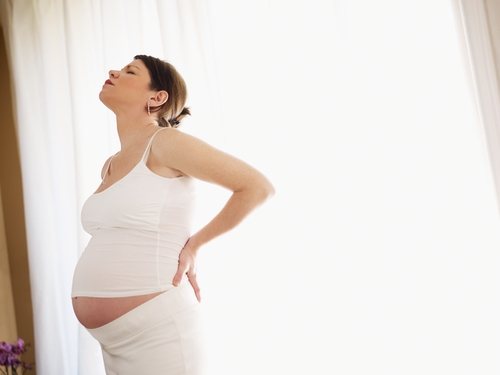
Painful sensations may occur during pregnancy. Some of them are the result of natural causes:
- The abdomen hurts and pulls (pain is localized in the right and left sides) with the natural softening and stretching of the uterine ligaments. They may bother you periodically and decrease after rest. Their occurrence and intensification occurs against the background of physical overload. As weight increases, the center of gravity shifts.
- At the same time, the back and lower back hurt. The pulling sensation intensifies in the evening in the sacrum and coccyx. Back pain, pain in the sacrum and coccyx intensify as the load increases. They decrease with rest and acupressure. Therefore, the opportunity to lie down during the day can significantly improve your well-being.
- The breast can not only have increased sensitivity, but also become a source of pain.
- The head may also hurt due to changes in blood pressure. Typically, such pain occurs when the weather changes and is a consequence of increased hormonal levels during pregnancy.
Pregnancy changes a woman’s hormonal levels and causes changes in the functioning of all organs and systems. In this regard, characteristic complaints of nausea, dizziness, and increased urination are observed. Sore throat, pain in the stomach, pain in the ovary, pain in the intestines are not among them. If they occur, it means there is some reason that needs to be eliminated. To do this, you need to seek medical help.
Possible pathologies
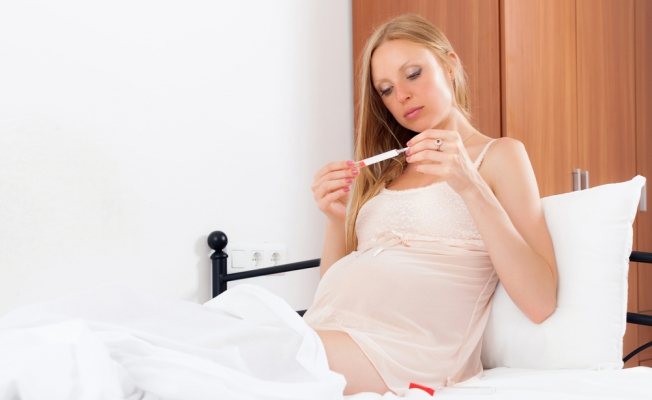
High fever in pregnant women in the 1st trimester can lead to miscarriage or developmental abnormalities in the fetus.
Starting from the 4th month, the unborn child’s nervous system rapidly develops.
Therefore, temperature at 13-18 weeks of pregnancy is extremely undesirable.
Temperature at 20-22 weeks of pregnancy is less dangerous for the fetus, but it is still necessary to inform a specialist about an increase in temperature values.
High temperature during pregnancy, observed over a long period of time, is dangerous for the normal development of the fetus.
When temperatures rise to high values, protein synthesis is disrupted and the condition of the placenta worsens.
Most often, a high temperature during pregnancy is a symptom of a cold. Moreover, temperature during pregnancy in the 1st, 2nd and 3rd trimester occurs with the same frequency. The course of the disease in women expecting a child is accompanied by the same symptoms as in an ordinary person - high temperatures, weakness, muscle aches, headache, rhinitis, sore throat. In this situation, the expectant mother needs qualified help.
Therefore, if the temperature during pregnancy in late or early stages is rapidly approaching 38 ºC and the symptoms described above are observed, you should immediately contact a medical facility. After a thorough examination and the necessary research, the doctor will make the correct diagnosis and prescribe appropriate treatment measures, which may require hospitalization.
Elevated temperature in pregnant women, both in the early stages and in the second and third trimester, can occur with the development of such severe infectious diseases as measles, rubella, and chickenpox. With these pathologies, temperature indicators reach high values, which can be extremely dangerous for the unborn child. The only way to protect yourself from the development of such diseases is to undergo timely vaccination.
Fever in pregnant women, occurring in combination with diarrhea, nausea, and vomiting, may be a symptom of poisoning.
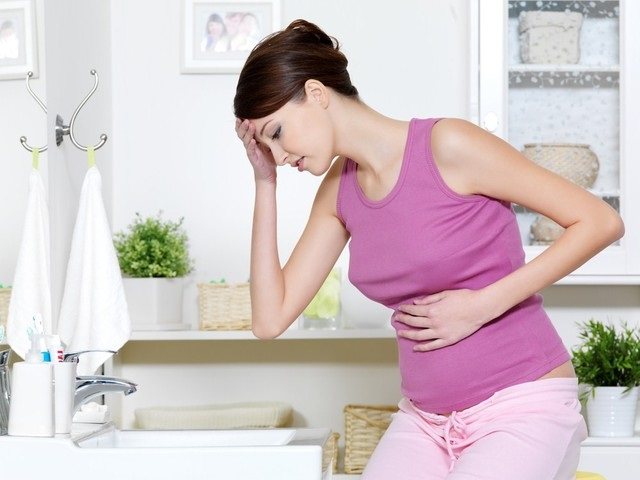
Many expectant mothers suffer from nausea and vomiting in the first weeks of pregnancy. However, fever during the 1st to 14th week of pregnancy, accompanied by vomiting, loose stools, and pain in the abdominal area, is a reason to immediately consult a specialist.
The temperature at 8-9 months of pregnancy may increase with the development of pyelonephritis. The growing fetus puts pressure on the ureters, as a result of which the outflow of urine is disrupted, which in turn can lead to infection. Inflammation of the kidneys, in addition to an increase in temperature, is accompanied by nagging pain in the lower back and abdomen, painful sensations when urinating, and general weakness.
Fever during pregnancy (first to third trimester) can in rare cases occur with the development of an allergic reaction.
What to do if your breasts stop hurting at 18 weeks?
The sensitivity of the mammary glands, their soreness, and the degree of enlargement during pregnancy are individual characteristics of a particular pregnancy. But even if the breasts have increased sensitivity from the first day of pregnancy, this will not necessarily continue all the time. The pain may decrease or stop at any time.
If movements and development of the fetus continue, then there is no reason for concern. If your chest suddenly stops hurting due to abdominal pain, dizziness, nausea or spotting, you should consult a doctor.
